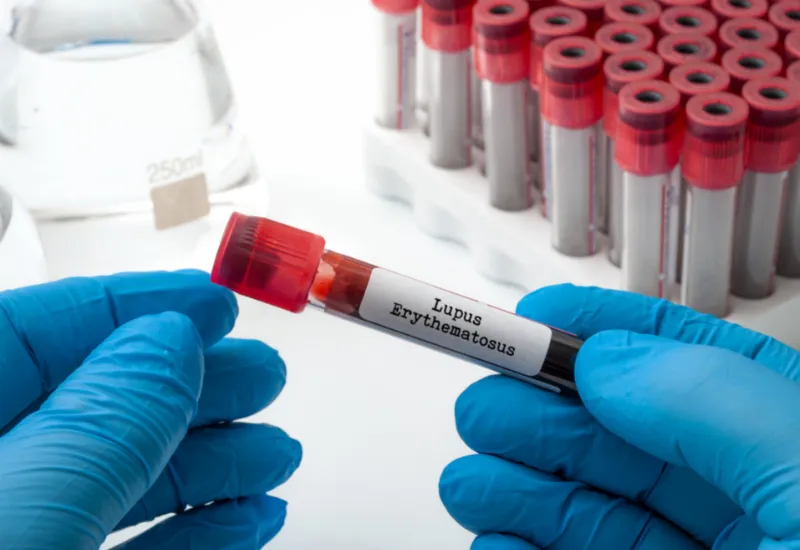What is an Anti-dsDNA Antibody Test?
Anti-double-stranded DNA antibodies are antinuclear antibodies that target the antigens of the double-stranded DNA. Produced by the immune system, these antibodies target the essential parts of a cell’s nucleus, especially its genetic material. The presence of anti-dsDNA antibodies aids in concluding a disease called “lupus,” and dsDNA blood tests detect their number.
Lupus, medically termed as systemic lupus erythematosus, is an autoimmune disorder in which an individual’s immune system starts malfunctioning and attacking healthy body tissues. Studies show that about 85% of people deal with anti-dsDNA antibodies if they have untreated Systemic lupus erythematosus (SLE).
How does the dsDNA Antibody Blood Test work?
An anti-double-stranded DNA blood test helps diagnose lupus in individuals who exhibit the signs and symptoms that point to lupus and have a positive test result for antinuclear antibody (ANA).
An ANA test is typically the first test that is performed to evaluate a patient for an autoimmune disorder. A positive ANA test result is seen in almost 95% of lupus cases but has been witnessed in other ailments as well.
The anti-dsDNA blood test is relatively specific for lupus and is performed to further narrow down the scope of autoimmune disorders for accurate diagnosis. For example, if a person has a positive ANA test, an anti-dsDNA test can help distinguish lupus from other autoimmune diseases with matching symptoms.
Some medical professionals prescribe an anti-dsDNA test with an anti-SM (Smith antibody) test. The Smith antibody is another antinuclear antibody typically associated with lupus, and thus an anti-SM test helps develop an accurate diagnosis. An anti-SM test is usually ordered as a part of an extractable nuclear antigen (ENA) panel. Depending upon a patient’s clinical signs, healthcare professionals may suggest other autoantibody tests to rule out suspicions about other autoimmune disorders as well.
Patients with lupus frequently have flare-ups in which symptoms worsen to a severe degree and then subside on their own. An increased anti-dsDNA level can be detected in episodes before or during these flare-ups. This test may be used to monitor lupus nephritis in particular, which is a severe complication of lupus that may cause inflammation and kidney damage. Lupus nephritis usually leads to high blood pressure, high levels of protein in the urine, and ultimately kidney failure when the autoantibodies bind to the antigens deposited in the kidneys.
When should you get an Anti-dsDNA Blood Test?
Medical professionals generally prescribe an anti-dsDNA blood test when an individual exhibits signs and symptoms that hint at lupus. It is also ordered when a person has a positive ANA test, especially in cases when the results of the test show a “speckled” or “homogeneous” fluorescent pattern.
Some common signs and symptoms of lupus are as follows:
-
Arthritis-like pain in one or more joints with little or no joint damage
-
Red rashes that seldom resemble a butterfly pattern across the cheek areas (malar rash) and the nose
-
Severe muscle pain
-
Low grade or intermittent fever
-
Weakness or persistent fatigue
-
Hair and weight loss
-
Increased skin sensitivity to light
-
Numbness or tingling sensations in the hands or feet
-
Damage or inflammation in organs and tissues, including the lungs, heart, kidneys, central nervous system, blood vessels, and lining of the heart
An anti-dsDNA is not a one-time procedure; it may be prescribed periodically to monitor the progression of disease or flare-ups in a lupus patient. It may also be ordered again after an initial negative test if the clinical signs and symptoms persist and a doctor strongly suspects lupus.
What do the results of a DNA antibody blood test mean?
The results of the dsDNA blood test are generally considered together with a patient’s signs and symptoms, medical history, and results of other autoantibody tests if carried out. However, a high level of anti-dsDNA in the blood points to lupus, especially if the anti-SM test is also positive.
In the case of lupus nephritis, a high titer (level) of anti-dsDNA is usually associated with damage to the kidneys and ongoing inflammation. Even a very low level of anti-dsDNA does not exclude a diagnosis of lupus even though it is considered negative. That is because only about 65-85% of lupus patients have high anti-dsDNA levels.
How much do dsDNA blood tests cost?
Anti-dsDNA antibody tests typically cost between $29 to $689, depending upon the patient’s geographical location, medical condition, insurance plan, and the type of medical testing facility. If you are looking to get yourself or your loved ones tested for dsDNA levels, Cura4U is the most suitable place for you.
Certified professionals at Cura4U offer Quest lab tests for as low as $9 and MRI, CT scan, X-ray scans starting from $60. Now you can schedule a lab test by simply uploading your prescription and getting up to 80% in 2200 Quest Diagnostics locations around the U.S! Head over to Cura4U right now to sign up!












